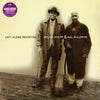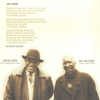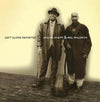







Archie Shepp & Mal Waldron - Left Alone Revisited (2LP)
ORDER LIMITED TO ONE ITEM PER CUSTOMER
Archie Shepp – tenor saxophone, soprano saxophone & vocal [click here to see more vinyl featuring Archie Shepp]
Mal Waldron – piano [click here to see more vinyl featuring Mal Waldron]
2 LPs, gatefold jacket
Limited edition
Original analog Master tape : YES
Heavy Press : 180g
Record color : Black
Speed : 33 RPM
Size : 12'’
Stereo
Studio
Record Press : unspecified
Label : Pure Pleasure
Original Label : Enja Records
Recorded Feb 7 & 8, 2002 at la Muse en Circuit, Paris
Produced by Werner Aldinger.
Remastered by Cicely Baston at Alchemy/Air Mastering
Originally released in 2002
Reissued in 2021
Tracks:
Side A:
- Easy Living
- Nice Work If You Can Get It
- Everything Happens To Me
Side B:
- Left Alon
- When Your Lover Has Gone
Side C:
- I Only Have Eyes For You
- Blues For 52nd Street
Side D:
- Porgy
- Lady Sings The Blues
- Left Alone (Spoken Lyrics)
Reviews:
“In February of 2002 pianist Mal Waldron and saxophonist Archie Shepp convened at La Muse en Circuit Studios in Paris, France, to record an album of duets for the German-based Enja label. By this point in their career both men had compiled extensive discographies with many distinguished titles. Some of Waldron’s albums trace back as far as the early days of the Prestige label while Archie Shepp’s first dates include early sessions on Impulse!, when the “New Thing” was in full force. Both men later recorded albums in countless different settings for dozens of labels from different countries. It would be easy to overlook an obscure album by such a prolific pair of musicians. That would be a mistake, however, as Left Alone Revisited is an important and unique release, and the new 2-LP reissue on Pure Pleasure, which was remastered by Cicely Baston at Alchemy/Air, well deserves the attention of any jazz fan.
By 2002 both musicians had considerable experience playing duets. In the case of Archie Shepp, who is now 84, his prowess for piano-and-saxophone duets was already well-known in the jazz community. Noteworthy projects included duets with pianist Horace Parlan on Steeplechase (1977’s Goin’ Home and 1980’s Trouble in Mind), and Looking at Bird with bassist Niels-Henning Ørsted Pederson (1980) is a brilliant distillation of Charlie Parker and bebop. Anyone lucky enough to track down a copy of Duet, Shepp’s 1978 collaboration with Dollar Brand on the Denon label, can testify to the chemistry between those two musicians.
Mal Waldron, who passed away on December 2, 2002, was no stranger to duets himself, with a discography that includes many projects with soprano saxophonist Steve Lacy. It was Waldron’s idea to record Left Alone Revisited, where he would revisit songs he performed with Billie Holiday when he accompanied her from April 1957 until her death in July 1959—and rarely or never played since then. “When Billie died I found it very painful to play any song associated with her,” Waldron explains in the liner notes to Left Alone Revisited. “But now, for the first time with Archie, or maybe because of Archie, selecting the material and performing the songs became for me a joyous time in which I recalled many positive and happy moments with Billie.” More than 40 years had passed between Holiday’s death and the recording of this album, and that begins to explain why Left Alone Revisited is such a memorable album.
Until recently, Left Alone Revisited was not available on vinyl, and Pure Pleasure chose wisely by releasing this particular record on wax, partly because the quality of the music warrants the white glove treatment the British audiophile label devoted to the project, but also because more jazz fans should be aware of the album. This edition should get their attention. The gatefold album cover with its glossy sepia-toned black-and-white photographs of the veteran players does justice to the veteran jazzmen in question. Although Shepp plays some soprano saxophone and even sneaks in some growly vocals after his tenor solo on “Blues for 52nd Street,” his main axe here is, as was normal for him, the tenor. What comes through with razor-sharp clarity on this vinyl pressing is the timbre of Shepp’s saxophone with its burnished tone; it sounds almost holographic, as if etched into space. In such a spare setting, restraint and subtlety are at a premium, and you hear every nuance of Shepp’s playing, including the scratchy tones at the quietest moments. Waldron’s piano sounds natural, real, and full, and the clarity of the recording matches the lucidity of his playing.
Some of the music on the record is uplifting and even celebratory. On “Nice Work if You Can Get It” and “Blues for 52nd Street,” it’s easy to imagine yourself in a club in New York City now or in an earlier era. In Shepp’s playing, you’ll hear echoes of Ben Webster while Mal Waldron sounds exactly like Mal Waldron; at this point, his approach hadn’t changed significantly in decades. He plays with extreme focus, and his playing is very precise; he doesn’t use a lot of notes, and when he solos, it’s almost like he’s distilling the very essence of the song. If his role in this project seems secondary, remember that he assumed a similar role under Billie Holiday.
Shepp and Waldron were great ballad players, and Left Alone Revisited contains several such performances that stand out for their artistry and sensitivity. On such titles as “Porgy,”, “Lady Sings the Blues,” and “Left Alone,” these two jazz artists really prove their mettle. It’s become somewhat of a cliché to say, when listening to veteran jazzmen ply their trade, “You can’t teach this stuff in music school.” But we’re going to have to say it one more time here, as these naked and intimate recordings clearly reflect the life experiences of the artists in question. There’s no question that Mal Waldron and Archie Shepp did a lot of living, and you hear it in these ballads.
I should note that there was one selection on this album that wasn’t part of Waldron’s repertoire with Billie Holiday. It’s a shame the song never got put to tape, as Waldron and Holiday wrote the song together. Plans were hatched to record the composition, but “Left Alone” was created near the turbulent end of Billie’s life, and she died before the planned recording session. The song first appeared as the title track to a Billie Holiday tribute album that Waldron released on the Bethlehem label shortly after Billie passed away. That version is an instrumental, and the melody is played (and quite beautifully) by alto saxophonist Jackie McLean. Waldron went on to record “Left Alone” many more times, sometimes as an instrumental and sometimes in a vocal setting. Perhaps the song haunted him, which would make sense considering the sad history behind it—that and the fact that, as an instrumental or a vocal performance, “Left Alone” is heartbreakingly beautiful. Musically and lyrically, it certainly bears Billie Holiday’s stamp; it’s easy to imagine her singing this song, as I have done many times since first hearing Abbey Lincoln perform it on her 1961 Candid release Straight Ahead. It’s a shame Billie never recorded “Left Alone,” but Waldron ensured that it would live on, releasing numerous versions over a 40-year period. Other artists have been drawn to it as well, and that has been true since its infancy, with performances dating as far back as the early 1960s, when Johnny Griffin, Jeanne Lee, Eric Dolphy, and others delivered their interpretations of the Holiday-Waldron cowrite.
Another artist who was drawn to “Left Alone” was Archie Shepp, who recorded it on the previously-mentioned Duet LP with Dollar Brand, which came almost 25 years before Left Alone Revisited. So Shepp had some history with the song prior to the 2002 record date, and his solo here is riveting. When Waldron follows with his solo, it’s easy to imagine him thinking back to a time when, in a dark, smokey jazz club in the late 50s, Lady Day whispered a song along the keyboard to a younger version of himself. Surely something like that would be impossible to forget.” Jeff Wilson, The Absolute Sound, December 2021
“In the world of female jazz vocalists, there are many iconic artists. At the top of this list are Ella Fitzgerald (with her phenomenal scat singing), Sarah Vaughan (four-octave range), Nina Simone (incisive socio-political commentary) and of course Billie Holiday. Because of her lilting vocal style and plaintive emotional delivery, Lady Day was a commanding presence. Songs like “Strange Fruit”, “Lady Sings The Blues”, “God Bless The Child” and her unique covers of standards were unforgettable. Her various personal struggles (including her premature death) contributed to her eternal legacy, along with the trademark white gardenia in her hair. In addition to an Oscar-nominated film biography, there have been several musical tributes to Ms. Holiday from the likes of Carmen McRae, Etta James, Dee Dee Bridgewater, Tony Bennett, Sam Cooke and Anita O’Day.
Another of these tribute albums, Left Alone Revisited was recorded by saxophonist Archie Shepp and pianist Mal Waldron in 2002. Pure Pleasure Records has released a 180-gram double vinyl of this project. Side A opens with the sumptuous ballad, “Easy Living”. Shepp’s deeply soulful translation includes some tonal stretching. Waldron low-key piano is exquisite and complements the saxophone. On his solo, Waldron demonstrates a silky touch and distills the inherent melancholy of the song. “Nice Work If You Can Get It” is classic “Show Gershwin”. With Waldron providing a relaxed bounce, Shepp’s restrained solo is rich in texture with vibrato. Waldron injects a subtle up tempo against his steady left hand. Shepp changes to soprano on another eternal standard “Everything Happens to Me”. His fluid play is countered by sharper tonality. Waldron folds in concise phrasing and consummate harmony. “Left Alone” was co-written by Holiday and Waldron. Waldron’s ethereal interpretation captures the profound emotional impact that Lady Day came to represent in her art. Waldron’s adroit chord maneuvering and timing is impeccable. His right hand notation is flawless. Shepp returns to tenor (with some piercing shrillness at times) to further explore the sad resonance. It is a fortunate piece of jazz history that both Holiday and Vaughan recorded “When Your Lover Has Gone”. Digging into that undeniable tradition of bluesy jazz, Waldron’s lilting piano runs are compelling with some New Orleans flair.
Great jazz musicians can re-imagine simple pop tunes into modern contexts. “I Only Have Eyes For You” enjoyed mainstream success with Dick Powell and Eddy Duchin. There was even a catchy doo wop version by The Flamingos. But this arrangement in 3/4 time is fresh and inventive. In a real change of pace, “Blues For 52nd Street” is structured in classical blues and exudes a raw quality that connects to this genre that is so closely associated with jazz. Waldron is brilliant and Archie Shepp adds some gritty vocals. George Gershwin’s legacy is broad with Porgy And Bess among the crowning achievements. So this extended (8:41) cover of “Porgy” is striking for its deliberate pace and faithful homage to this Americana treasure. Shepp’s command of melodic development and Waldron’s expertise at graceful articulation is wonderful. Neither musician overshadows the tune’s elegiac dignity with gratuitous improvisation. On “Lady Sings The Blues”, a relaxed, sorrowful vibe is infused by the duo. A very brief spoken word reprise of “Left Alone” is an interesting and fitting conclusion to this glowing tribute.
Pure Pleasure Records has done an excellent job in re-mastering Let Alone Revisited to 180-gram vinyl. The overall mix is clean and uncluttered. More importantly, it keeps the historical role of jazz in American culture alive.” Robbie Gerson, Audiophile Audition, October 2021
“Mal Waldron's first tribute to Billie Holiday, titled Left Alone, was recorded in 1959, mere months before the singer's death. He returned to salute the legendary vocalist on several occasions since then, with this CD likely being his final tribute, recorded less than a year before his own death. Waldron, who worked with Holiday during her last years, is intimately familiar with her takes of the six standards heard on this disc, along with her own "Lady Sings the Blues." Archie Shepp's often gritty tenor sax is reminiscent of the texture of Holiday's voice, yet he perfectly complements Waldron's lush piano. They also pack a punch with their stark performance of "Left Alone" (Shepp's occasional reed squeaks seem deliberate, as if to imitate breaks in her voice). Waldron also recites Holiday's lyrics set to his composition at the conclusion of the CD. Shepp switches to soprano sax for an emotional take of "Everything Happens to Me" and "I Only Have Eyes for You," with the latter song sounding as if the unheard singer is being ignored by her love interest. Shepp's "Blues for 52nd Street" is both sassy and swinging. This instrumental salute to Billie Holiday is one of the best albums ever to honor her memory.” AllMusic Review by Ken Dryden
Ratings :
AllMusic : 4.5 / 5 ; Discogs : 4.4 / 5 ; Audiophile Audition : 4.5 / 5


